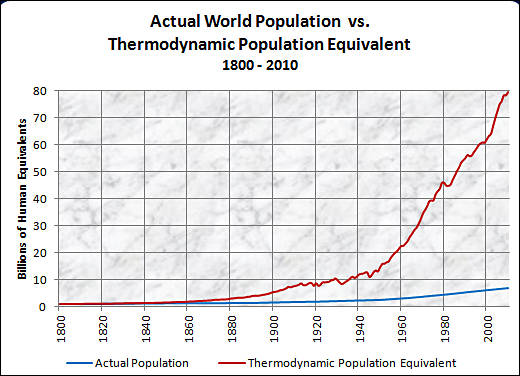
-
Average energy of a 42-gallon barrel of oil is 5.8 million Btu, or British thermal units. By definition, one Btu of energy will raise 1 pound of water by 1 degree Fahrenheit, so about 75 Btu are needed to boil a cup of water to make your morning coffee or tea.
The 5.8 million Btu figure is called a Barrel of Oil Equivalent, or BOE. One barrel of oil has the same energy content as 5,800 cubic feet of natural gas. A cubic foot of natural gas contains about 1,000 Btu. For electricity, 1 barrel is 1,700 kilowatt hours.
So, is oil really worth $100 a barrel? Another way of looking at it is to compare oil to a horse. A horse laboring a standard 40-hour work week (eight hours a day, five days a week, 50 weeks a year) would have to labor for more than one year to produce the energy in a barrel of oil. Do you think a horse could be fed and maintained for a year for $100? Not likely.
Human labor is even worse. A fit human adult can sustain about one-tenth of a horsepower, so a human would have to labor more than 10 years to equal a barrel of oil.
Btw it also shortest explanation for quality of life changes that happened in 20th century.
As well as many newest wars for resources. And, of course, why robots are much more effective.P.S. Btw slightly different calculations exist, some say about 12-13 years of human work.
-
Never thought about it that way... a real eye opener to the modern conveniences we take for granted today.
-
Actually, oil would be much cheaper if US hadn't decided for strategic reasons that its main supplier of oil would be Canada. But tar sand oil is very expensive to extract, so if oil price went below $60/barrel the whole Canadian tar sand industry would be shut down instantly.
-
It is good theory, but it is wrong theory. You can check world available oil export resources charts and data back in blog. In fact, today both EU and US QE main points is to keep prices low (interesting isn't it? keeping prices low by printing money :-) )
-

 gh4_4.jpg735 x 539 - 98K
gh4_4.jpg735 x 539 - 98K -
Another calculation:
According to the US Energy Information Administration18, one (US) gallon of gasoline equates to 124,238 BTU of energy, which in turn corresponds to 36.4 kwh19. Since one hour of human physical labour corresponds to between 74 and 100 watts, the labour-equivalent of the gasoline is in the range 364 to 492 hours of work. Taking the average of these parameters (428 hours), and assuming that the individual is paid $15 per hour for this strenuous and tedious activity, it would cost $6,420 to get the car back to the start-point. On this rough approximation, then, a gallon of fuel costing $3.50 generates work equivalent to between $5,460 and $7,380 of human labour.
Howdy, Stranger!
It looks like you're new here. If you want to get involved, click one of these buttons!
Categories
- Topics List23,964
- Blog5,723
- General and News1,342
- Hacks and Patches1,151
- ↳ Top Settings33
- ↳ Beginners254
- ↳ Archives402
- ↳ Hacks News and Development56
- Cameras2,361
- ↳ Panasonic990
- ↳ Canon118
- ↳ Sony154
- ↳ Nikon96
- ↳ Pentax and Samsung70
- ↳ Olympus and Fujifilm99
- ↳ Compacts and Camcorders299
- ↳ Smartphones for video97
- ↳ Pro Video Cameras191
- ↳ BlackMagic and other raw cameras121
- Skill1,961
- ↳ Business and distribution66
- ↳ Preparation, scripts and legal38
- ↳ Art149
- ↳ Import, Convert, Exporting291
- ↳ Editors191
- ↳ Effects and stunts115
- ↳ Color grading197
- ↳ Sound and Music280
- ↳ Lighting96
- ↳ Software and storage tips267
- Gear5,414
- ↳ Filters, Adapters, Matte boxes344
- ↳ Lenses1,579
- ↳ Follow focus and gears93
- ↳ Sound498
- ↳ Lighting gear314
- ↳ Camera movement230
- ↳ Gimbals and copters302
- ↳ Rigs and related stuff272
- ↳ Power solutions83
- ↳ Monitors and viewfinders339
- ↳ Tripods and fluid heads139
- ↳ Storage286
- ↳ Computers and studio gear560
- ↳ VR and 3D248
- Showcase1,859
- Marketplace2,834
- Offtopic1,319









